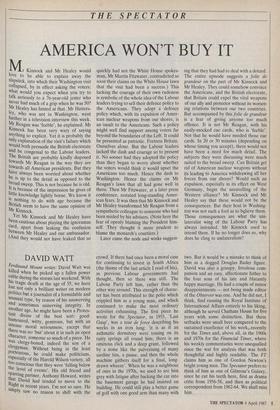THE SPECTATOR
AMERICA WON'T BUY IT
Mr Kinnock and Mr Healey would love to be able to explain away the slapstick, into which their Washington visit collapsed, by in effect asking the voters: what would you expect when you try to talk seriously to a 76-year-old jester who never had much of a grip when he was 50? Mr Healey has hinted at that. Mr Hatters- ley, who was not in Washington, went further in a television interview this week. Mr Reagan was 'feeble', he explained. Mr Kinnock has been very wary of saying anything so explicit. Yet it is probably the only explanation of the visit's failure which would both persuade the British electorate and be congenial to the Labour leaders. The British are probably kindly disposed towards Mr Reagan in the way they are towards all American presidents. But they have always been worried about whether he is up to the detail as opposed to the broad sweep. This is not because he is old. It is because of the impression he gives of little knowledge lightly borne. We know it is nothing to do with age because the British seem to have the same opinion of Mr Kinnock.
Yet Mr Kinnock and Mr Healey have been cautious about playing the ignoramus Card, apart from leaking the confusion between Mr Healey and our ambassador. (And they would not have leaked that so quickly had not the White House spokes- man, Mr Martin Fitzwater, contradicted so soon their claims on the White House lawn that the visit had been a success.) This lacking the courage of their own rudeness is symbolic of the whole idea of the Labour leaders trying to sell their defence policy to the Americans. They adopt a defence policy which, with its expulsion of Amer- ican nuclear weapons from our shores, is an insult to the Americans. Such a policy might well find support among voters far beyond the boundaries of the Left. It could be presented as patriotic. Fortress Britain. Ourselves alone. But the Labour leaders lacked the dash and courage so to present it. No sooner had they adopted the policy than they began to worry about whether the voters would think it would upset the Americans too much. Hence the dash to Washington. Hence the claims on Mr Reagan's lawn that all had gone well in there. Then Mr Fitzwater, at a later press conference, restated long-standing Amer- ican fears. It was then that Mr Kinnock and Mr Healey transformed Mr Reagan from a sympathetic colleague to someone who had been misled by his advisers. (Note here the fear of openly blaming, the President him- self. They thought it more prudent to blame the monarch's courtiers.) Later came the nods and winks suggeSt- ing that they had had to deal with a dotard. The entire episode suggests a folie de grandeur on the part of Mr Kinnock and Mr Healey. They could somehow convince the Americans, and the British electorate, that Britain could expel the vital weapons of our ally and protector without its worsen- ing relations between our two countries. But accompanied by this folie de grandeur is a fear of giving anyone too much offence. It is not Mr Reagan, with his easily-mocked cue cards, who is 'feeble'. Not that he would have needed those cue cards. In 20 or 30 minutes (depending on whose timing you accept), there would not have been a need for much detail. The subjects they were discussing were much suited to the broad sweep. Can Britain get rid of American nuclear weapons without its leading to America withdrawing all her forces from our shores? Would such an expulsion, especially in its effect on West Germany, begin the unravelling of the Western alliance? Mr Kinnock and Mr Healey say that these would not be the consequences. But their host in Washing- ton was not such a fool as to b;lieve them. Those consequences are what the uni- lateralist wing of the Labour Party has always intended. Mr Kinnock used to intend them. If he no longer does so, why does he cling to unilateralism?


























































 Previous page
Previous page